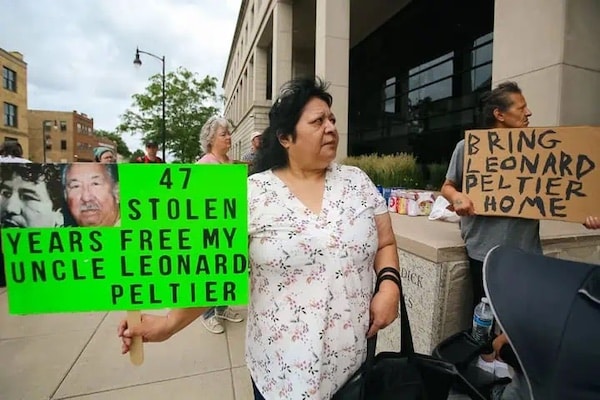Mr. President, If you can pardon your son, why can’t you free the Indigenous political prisoner Leonard Peltier?
The 80-year-old man, a leader of the American Indian Movement, has been imprisoned for 48 years. He suffers from diabetes, high blood pressure, and a heart condition.
The FBI framed Leonard Peltier in retaliation for the historic 1973 occupation of Wounded Knee. Three years of violence followed this courageous stand for Indigenous rights, with over 60 AIM members and supporters murdered. Despite a large FBI presence, nothing was done to stop these murders and even more numerous assaults.
Peltier was convicted of killing two FBI agents—Jack Coler and Ronald Williams—in a shootout on the Pine Ridge Reservation on June 26, 1975. The agents were in unmarked cars.
Leonard Peltier was asked by traditional people at Pine Ridge, who were being targeted, to protect them from violence. Peltier and a small group of young AIM members set up camp on a ranch owned by the traditional Jumping Bull family. More than 150 FBI agents, cops, and vigilantes surrounded the ranch when shooting began.
Besides the two FBI agents killed, an AIM member—Joseph Stuntz Killsright—was shot and killed by a sniper’s bullet. His death has never even been investigated.
Although the FBI claim that 40 Indigenous people were involved in the gunfight, only AIM members Bob Robideau, Darrell Butler, and Leonard Peltier were brought to trial. A jury acquitted Robideau and Butler on grounds of self-defense.
Leonard Peltier was arrested in Canada on Feb. 6, 1976. The U.S. government in its extradition request, used affidavits signed by Myrtle Poor Bear who claimed she saw Leonard Peltier shoot the two FBI agents.
Ms. Poor Bear had never met Mr. Peltier and wasn’t present during the shoot-out. Soon after, Ms. Poor Bear recanted her statements and said the FBI threatened and coerced her into signing the affidavits.
Leonard Peltier was brought to the United States and tried in 1977. Myrtle Poor Bear wasn’t allowed to testify by the Nixon-appointed Judge Paul Benson. Not one witness identified Mr. Peltier as the shooter of the FBI agents.
More than 140,000 pages of FBI documents were withheld from the defense. A ballistic test proving that a bullet casing found near the FBI agents’ bodies did not come from the gun tied to Mr. Peltier was intentionally concealed.
Because this evidence was withheld, the jury found Leonard Peltier guilty. Judge Benson sentenced Mr. Peltier to two consecutive life terms.
The Eighth Federal Appeals Circuit ruled that “there is a possibility that the jury would have acquitted Leonard Peltier had the records and data improperly withheld from the defense been available to him in order to better exploit and reinforce the inconsistencies casting strong doubts upon the government’s case.”
Yet, the court denied Mr. Peltier a new trial. The late Federal Judge Gerald William Heaney, who wrote the decision denying a new trial, later urged Leonard Peltier’s release, stating that the FBI used improper tactics to convict him.
Among those calling for Leonard Peltier’s freedom was the late South African President Nelson Mandela, who spent 27 years in apartheid prisons. Leonard Peltier has spent 48 years in federal prisons.
Mr. President, you recently apologized for the federal government’s role in running boarding schools where thousands of Native American children endured abuse, neglect, and eradication of their tribal identities.
Follow up on your apology by freeing Leonard Peltier.

